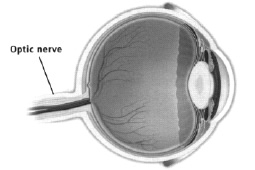Educational Materials: Ischemic Optic Neuropathy
 Decreased blood flow to the eye’s optic nerve can cause loss of vision
Decreased blood flow to the eye’s optic nerve can cause loss of vision
Ischemic (pronounced iss-KEE-mik) optic neuropathy (ION) is a
relatively sudden loss of central and/or side vision due to decreased
or interrupted blood flow to the eye’s optic nerve.
In order for you to see, the optic nerve carries impulses from the
eye to the brain, where they are interpreted as images. Without a
healthy, functioning optic nerve, vision would not be possible.
What Causes ION?
There are different risk factors for developing ION, including:
- older age (over age 50);
- high blood pressure;
- diabetes;
- smoking;
- arterial disease (clogged arteries);
- glaucoma (high intraocular pressure);
- migraine headaches;
- temporal arteritis (inflammation of certain arteries, including those to the eye).
What are the symptoms of ION?
Before ION occurs, many people experience transient ischemic attacks (TIA)-a temporary reduction of blood flow to the optic nerve. During the attack, vision becomes dark for a few seconds or minutes and then returns to normal. You should see your
ophthalmologist or physician immediately if you experience such episodes. TIAs are warning signs that a complete blockage of blood flow to the eye may occur.
An ophthalmologist may be able to detect warning signs of ION during an eye examination. The examination may involve dilating (temporarily widening) the pupil with eyedrops in order to check for swelling of the optic nerve or inflammation of arteries in the eye. Tests for intraocular pressure and glaucoma may be performed, as well as testing your side vision.
What are the effects of ION?
When blood flow to the optic nerve is reduced or blocked, the nerve is deprived of oxygen and nutrition. Without sufficient oxygen and nutrition, the nerve cannot function properly and will eventually die. The amount of vision loss depends on how much and how long the optic nerve was deprived of oxygen and nutrition.
Vision loss from ION is usually permanent. Complete loss of vision is rare; even people with severe ION retain some useful side vision:
Can ION be treated?
If ION was caused by temporal arteritis (inflammation of arteries in the eye), patients have a very high chance of the other eye being affected unless treated with steroid tablets (cortisone). The steroids help prevent ION from occurring in the other eye, but rarely improve vision lost from ION in the affected eye.
In most cases of ION, there is no proven treatment to improve vision. However, the use of low-vision devices and techniques-including large print materials, bright lighting, high contrast materials and magnifying devices-can help you continue to perform many of your daily activities independently.
